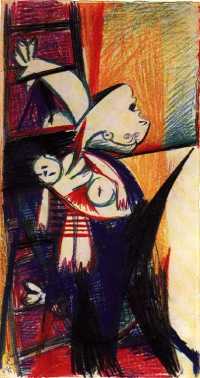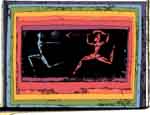Aristophanes' Lysistrata
Stop the war!
An interactive version of Aristophanes' third and greatest play about the war with Sparta which had already lasted nearly 20 years when he wrote Lysistrata in 411 BC.
The "sex-strike" is not a serious proposal: any more than the "personal peace" made by Dikaiopolis in the Acharnians (while everyone else is still at war, the hero rediscovers all the delights of peacetime living). Nor was flying to heaven on a giant dung beetle to rescue the goddess Peace from the pit where War has buried her an actual policy advocated by Aristophanes in Peace. But he does show his audience how, from someone else's perspective, war could be seen as stupid, trivial, irrational and unnecessary. The events of early 2003 (the invasion of Iraq by a "coalition" led by George W. Bush and Tony Blair) demonstrated how we miss Aristophanes, desperately.
 The
heroine's name means "Bring Our Boys Home" - the disbander of
the army.
The
heroine's name means "Bring Our Boys Home" - the disbander of
the army.
In the original production all the parts were played by men. There were no laws of libel or slander in Athens, and direct attacks on politicians were all part of the fun in an Athenian comedy. All actors playing male roles were equipped with a larger-than-life leather phallus, which was frequently used as a weapon or for other business. Coarse ribaldry was also a traditional part of the art of Aristophanes and his rival comedians (it had some kind of ritual therapeutic effect, no doubt). The choruses sang and danced. The play was originally produced as part of a religious festival - and also a competition.
We must pay tribute to Aristophanes' sympathetic views on Sparta - most daring if he hoped to win the prize in wartime. The film of Grahame Greene's Quiet American did not win any awards in 2003.
Lysistrata was produced in 411 BC - when Athens' situation looked utterly bleak. They'd lost an army in Sicily, and the only super-power, Persia, was actively supporting Sparta. Later this year, even the cherished democratic government - which had been so hard won over past century - would be abandoned.
Very few modern versions - translations or productions - can do full justice to the play. But remember it's not a "feminist" play in any way whatsoever - women seizing the Acropolis was an imaginative flight of fantasy - as surreal as Cloudcuckooland, the city built in Aristophanes' comedy Birds half way between earth and heaven.
The great (and sadly late) Bill Hicks in my view comes closest to the Aristophanic frame of mind - intensely serious about both changing the world and making people laugh. He also knew that audiences come for the dick jokes, but listen to the rant. He also was missed in 2003.
See also War and Peace: discussion of Aristophanes' Peace
Review with pictures of a student production


